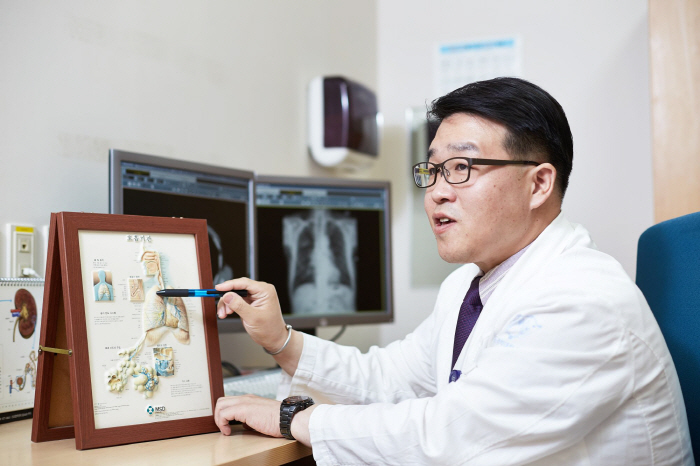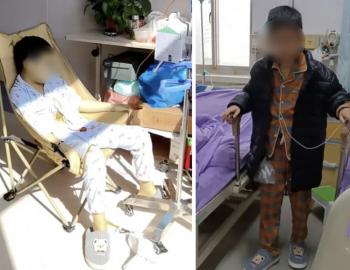Pneumonia Cases Surge 2.2 Times in November...Fatal to the Elderly and Infants, Vaccination Important
Nov 12, 2025
|
In the meantime, cough and fever, which are easy to pass with simple cold or flu symptoms, can be a sign of 'pneumonia', so caution is needed. In particular, it can be fatal for the elderly, chronically ill, and children.
An expert also described pneumonia as `the last disease a doctor treats, and the last pain that humans suffer.' It shows how serious pneumonia is and how difficult it is to treat.
◇ The number of patients in November is 2.2 times higher than in February...Most of the elderly and infants
According to data from the Health Insurance Review and Assessment Service, the number of pneumonia patients in November last year was 353,123, about 2.2 times higher than the lowest number of 158,265 in February. Large daily temperature differences, increased internal activities, the spread of various respiratory viruses, and decreased immunity are cited as the main reasons.
When looking at patients by age last year, about 43% of patients under the age of 10 accounted for the most, and those in their 60s and older accounted for about 22%.
Pneumonia is a disease in which the lungs are inflamed by infection with bacteria or viruses.
Bacterial pneumonia caused by pneumococcus is common, which usually resides on the mucous membranes of the nose and throat. When our body's immunity weakens, it penetrates the lungs, brain, blood vessels, and ears, causing pneumonia and meningitis.
Patients with the flu or cold are secondary to bacterial pneumonia. This is because the bronchial and pulmonary mucosa are damaged by the virus, which weakens the defense of the lungs and allows pneumococci to easily penetrate the lungs through the gap.
Initial symptoms are similar to common colds such as fever, cough, and phlegm. If it worsens afterwards, it causes a high fever, severe cough, chest pain, and shortness of breath.
There is little fever or cough, and instead, it may appear as loss of appetite or general weakness.
If ▲ appetite is lower than usual, ▲ energy is weakened, or ▲ consciousness is dull, it is better to be tested in consideration of the possibility of pneumonia.
◇ It may lead to respiratory failure and sepsis...Basic antibiotic treatment
Healthy adults can get well easily with antibiotic treatment and moderate rest.
However, the elderly, chronically ill, and infants with weak immune systems can lead to severe pneumonia once they contract pneumonia.
They fall into respiratory failure and receive ventilator treatment in the intensive care unit, or their blood pressure drops due to sepsis, leading to fatal shock.
Pneumonia is divided into viral and bacterial, and there are differences in treatment.
Viral pneumonia is treated differently depending on the causative virus, and in general, conservative treatments such as fluid supply, antipyretics, and oxygen treatment are centered. However, antiviral drugs may be used in certain viral infections such as influenza or COVID-19. Bacterial pneumonia is caused by bacteria, so antibiotic treatment is the basis.
Even if pneumonia recovers, it takes some time for the lung tissue to completely return to normal. In the process, dry cough or fatigue can last up to about two months, which is a natural phenomenon that occurs during the recovery process after inflammation.
◇Preventive vaccine reduces pneumonia fatality rate by 40%...Personal hygiene management is also important
The best way to prevent pneumonia is to get vaccinated. Some studies show that vaccinating pneumococcal vaccines can prevent chronic patients from having 65-84% of preventive effects, and that the mortality rate or intensive care unit hospitalization rate is reduced by 40% compared to unvaccinated patients. Professor Choi Chun-woong of the Department of Respiratory Allergy at Gangdong Kyunghee University Hospital emphasized that "The vaccine does not prevent 100% pneumonia, but it is important to get the pneumococcal vaccine for the elderly over 65 years of age or those with chronic diseases to prevent it from developing into severe disease.'
In the case of Korea, from October 1 this year, children and adolescents aged 2 months or more and under 18 years of age have been vaccinated free of charge with the 'PCV20 pneumococcal vaccine'. Seniors over the age of 65 can also receive the pneumococcal vaccine (PPSV23) free of charge as part of the national vaccination project.
Professor Choi Chun-woong advised that `Pneumococcal vaccines are effective only with one dose' and"According to recent statistics, the prevalence of pneumonia is increasing from the age of 50, so it is better to get a pneumococcal vaccine after the age of 50.'
Personal hygiene management is also important.
If possible, avoid crowded places or wear masks, wash your hands after outdoor activities, and pay attention to oral cleanliness by rinsing your mouth.
Increasing immunity is also necessary.
It is recommended to keep your body temperature warm and practice 6-8 hours of sleep a day, regular exercise, and nutritious meals.
For exercise, walking, jogging, and stretching are appropriate five times a week for 30 minutes a day. Excessive exercise rather increases stress hormones (cortisol) and lowers immunity.
A diet that enhances immunity is recommended for vegetables rich in vitamins A, C, and E (400g per day, 2 paper cups), fruits (200g), nuts (100g), and protein-rich chicken breasts (100g), eggs (1 to 2), tofu (100g), fish (100g), and low-fat meat (100g).
|
This article was translated by Naver AI translator.















